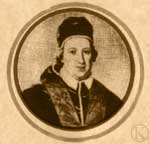POPE INOCENT XIII
245TH Pope (1721-1724)

Home
Kolbe Library
Annals of Catholicism
Born at Rome, 13 May, 1655; died at the same place, 7 March, 1724. He was the son of Carlo II, Duke of Poli. After studying at the Roman College he was introduced into the Curia by Alexander VIII, who in 1690 commissioned him to bear the blessed hat (berettone) and sword (stocco) to Doge Morosini of Venice. In 1695 he was made Titular Archbishop of Tarsus and nuncio at Lucerne, and in 1697, nuncio at Lisbon. Clement XI created him Cardinal-Priest of Santi Quirico e Giulitta on 17 May, 1706, conferred on him the Diocese of Osimo in 1709, and that of Viterbo in 1712. Sickness compelled him to resign his see in 1719. After the death of Clement XI he was elected pope in a stormy conclave on 8 May, 1721. In memory of Innocent III, to whose lineage he belonged, he chose the name of Innocent XIII. Soon after his succession he invested Emperor Charles VI with the Kingdom of Sicily and received his oath of allegiance in 1722. When, a year later, the emperor invested the Spanish prince Don Carlos, with Parma and Piacenza, the pope protested on the ground that these two duchies were under papal suzerainty. His protests, however, remained unheeded. Like his predecessor, be gave an annual pension to the English Pretender, James III, the son of the dethroned Catholic King, James II, and even promised to aid him with 100,000 ducats, in case an opportunity should offer itself to regain the English Crown by force of arms. He also assisted the Venetians and especially the Island of Malta in their struggle against the Turks. In the dispute of the Jesuits with the Dominicans and others, concerning the retention of various Chinese Rites among the Catholic converts of China, Innocent XIII sided with the opponents of the Jesuits. When in 1721 seven French bishops sent a document to Rome containing a petition to suppress the Constitution "Unigenitus" in which Clement XI had condemned the errors of Quesnel, Innocent XIII not only condemned the writing of the bishops, but also demanded unconditional submission to the Constitution. He was, however, weak enough to yield to French pressure and raise the unworthy Prime Minister Dubois to the cardinalate. He, indeed, exhorted the minister to change his wicked life, but his exhortations remained useless. (For a milder view of Dubois see Bliard, "Dubois, cardinal et premier ministre", Paris, 1901.) In a Bull of March, 1723, he regulated numerous abuses in Spain and was assisted in the execution of this Bull by King Philip V of Spain. The fears which were raised in the beginning of his pontificate that he would yield to nepotism were entirely groundless. He elevated his brother to the cardinalate, but did not allow his revenues to exceed 12,000 scudi as had been stipulated by Pope Innocent XII.
MAYER, Papstwahl Innocenz' XIII (Vienna. 1874); Leben Papst Innocentii XIII (Cologne. 1724); MICHAUD, La fin de Clément XI et le commencement du pontificat d'Innocent XIII in Internationale theologische Zeitschrift, V, 42-60, 304-331.
MICHAEL OTT
|



